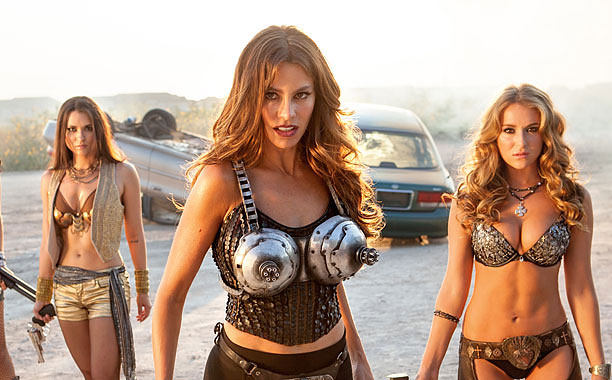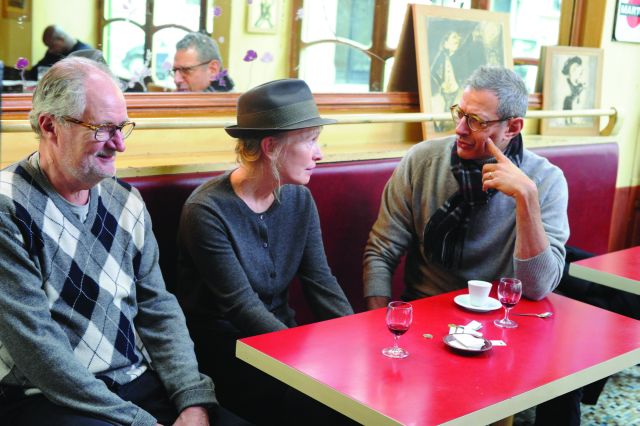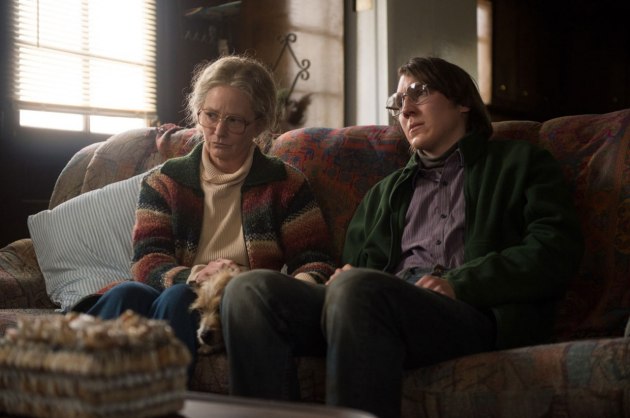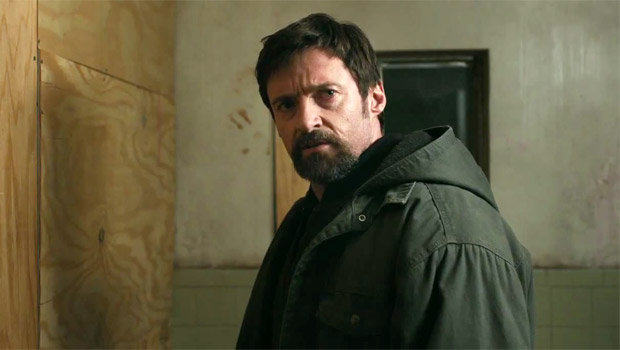As good as many films are, few have the “wow” factor that leaves you elated, high as a kite. Gravity is one of those. Alfonso Cuarón’s space drama is a cinematic tour-de-force, after which it takes quite a while to come back to Earth.

In a deranged world where Charlie Sheen is President of the United States, Hollywood gets a much-deserved and highly amusing roasting. Robert Rodriguez’s sequel to Machete goes straight for the jugular by mocking Hollywood's golden child, that "galaxy far, far away" film franchise - which doggedly refuses to sling its hook. Rodriguez not only flips his middle finger at reboots and outworn action clichés, he also takes jabs at US foreign policy and the controversy surrounding the Mexican border fence.
In keeping with the absurd humour of the previous film, POTUS demands that Machete (played once again by Danny Trejo) head to Mexico to solve the drug cartel problem in exchange for American citizenship. This impossible mission plays out like a Bond film but has more in common with the Austin Powers franchise. Violence and comedy go hand in hand here, with one joke after another massacring the logic of the Hollywood machine and its minimal and reductive roles for anyone outside a certain demographic. In his fight for justice and a green card, Machete comes up against evil mastermind Voz, played by the-no-longer-ubiquitous-for reasons-everyone-knows Mel Gibson, who inhabits a secret lair loaded with movie history weaponry – which sets up some of the funniest moments in the film.
 Female roles are thankfully varied: Michelle Rodriguez (who, while we’re on the subject of a lack of decent roles for women in Hollywood, would be brilliant as Wonder Woman in the Justice League film when that happens) reappears in the role of Luz, who has moved from her taco truck to a warehouse as head of an underground resistance, now using technology to fight their battle. Sofia Vergara (pictured above centre) pops up as a gun-toting whorehouse madam, Amber Heard as a spy with a Miss San Antonio guise, Lady Gaga as a bad-ass bounty hunter and Vanessa Hudgens (still shedding her Disney tag) as the daughter of the head of the drug cartel.
Female roles are thankfully varied: Michelle Rodriguez (who, while we’re on the subject of a lack of decent roles for women in Hollywood, would be brilliant as Wonder Woman in the Justice League film when that happens) reappears in the role of Luz, who has moved from her taco truck to a warehouse as head of an underground resistance, now using technology to fight their battle. Sofia Vergara (pictured above centre) pops up as a gun-toting whorehouse madam, Amber Heard as a spy with a Miss San Antonio guise, Lady Gaga as a bad-ass bounty hunter and Vanessa Hudgens (still shedding her Disney tag) as the daughter of the head of the drug cartel.
The furiously fast-paced postmodern humour subverts the sexualisation of women in film by using and pushing it to its limits in a very cheeky way. In no way is the genre of grindhouse off limits either, with the outdated attitudes to women in many of those films taking a beating - the women get to cock their breastplated guns and deliver comical take-downs as recompense.
Considering the character of Machete first sprang to life in a manufactured trailer in Planet Terror (Rodriguez’s entry in the double feature Grindhouse, made with Quentin Tarantino), his longevity is surprising. And this stoned-faced, almost silent character isn’t quite over the hill yet - here we see him mocking Twitter (“Machete don’t tweet” he quips). Perhaps he aims at too many targets, but Rodriguez knows how important it is to laugh at himself and the inconsistencies of an industry that isn’t always representative of its viewers.

One of the joys of autumn is the seasonal return to films about - and intended for - grown-ups, and movies don't come much more crisply and buoyantly adult than Le Week-End, at once the latest and best from the director/writer team of Roger Michell and Hanif Kureishi. The abundant wisdom of the pair's third screen collaboration within 10 years surely reflects the growing awareness that comes with age of the derailments, large and small, that lie scattered along life's way.
But whereas one might expect a gathering dourness from this excavation of marital fissures as they are laid bare during a Birmingham couple's anniversary weekend in France, the film benefits from a glancing whimsy that is itself definably Gallic: it's as if the very presence of Paris has put a spring in everyone's step (a condition to which Woody Allen of late would clearly relate), leaving its blissful trio of stars to do the rest. And, zut alors, do they ever.
 Jim Broadbent and Lindsay Duncan (pictured right with the film's third lead, Jeff Goldblum) are expertly matched as a couple who have barely settled into their Eurostar seats before the cracks in their conjugal union are beginning to show. Nick (Broadbent) is financially fretful, sexually unfulfilled, and browbeaten. He is also deeply smitten with Meg (Duncan), his coolly analytical spouse who jokes about being "tri-polar" and accuses her husband of 30 years of chewing his food like an "old horse at a trough". Will these few days away mark time for the pair at whatever cost to a family back home who are intermittently referenced via phone calls and the like?
Jim Broadbent and Lindsay Duncan (pictured right with the film's third lead, Jeff Goldblum) are expertly matched as a couple who have barely settled into their Eurostar seats before the cracks in their conjugal union are beginning to show. Nick (Broadbent) is financially fretful, sexually unfulfilled, and browbeaten. He is also deeply smitten with Meg (Duncan), his coolly analytical spouse who jokes about being "tri-polar" and accuses her husband of 30 years of chewing his food like an "old horse at a trough". Will these few days away mark time for the pair at whatever cost to a family back home who are intermittently referenced via phone calls and the like?
Maybe but just as possibly not, given the intermingling of opposites that for some while, one senses, has kept this marriage on track. "You can't not love and hate the same person," Nick decides, some time before he twice praises Meg as "hot" only to add the words "but cold" immediately after. The film is startlingly alert to the Janus-faced qualities of desire and desperation, and its neatly structured narrative gets a fillip from the introduction of a spry, wry Jeff Goldblum in prime form as Morgan, an old Cambridge pal of Nick's who has effected his own escape to Paris with a much younger, and pregnant, wife.
 Is Morgan living any man's midlife dream? Once again, the film is too smart to answer decisively beyond building to a dinner party (with Goldblum, pictured left) that culminates in a monologue from Nick that looks set to become an acting class staple - though good luck to anyone attempting to better the haunted sense of self that Broadbent brings to every second of a superlative performance. His grasping cry of "don't do that" ranks in power with the "please don't" that accompanies the climax of Tom Stoppard's The Real Thing, as befits a film steeped in a full-blooded awareness of the theatre that is in no way stagey (the central pair are seen visiting Beckett's grave, while Broadbent's work puts one in mind on occasion of a celluloid Vanya.)
Is Morgan living any man's midlife dream? Once again, the film is too smart to answer decisively beyond building to a dinner party (with Goldblum, pictured left) that culminates in a monologue from Nick that looks set to become an acting class staple - though good luck to anyone attempting to better the haunted sense of self that Broadbent brings to every second of a superlative performance. His grasping cry of "don't do that" ranks in power with the "please don't" that accompanies the climax of Tom Stoppard's The Real Thing, as befits a film steeped in a full-blooded awareness of the theatre that is in no way stagey (the central pair are seen visiting Beckett's grave, while Broadbent's work puts one in mind on occasion of a celluloid Vanya.)
Duncan is every bit as remarkable as the comparatively self-contained Meg, a tougher role in that this spoken embodiment of "melting ice" threatens to lob sympathy firmly in Nick's court: to that extent, one can tell that this is a movie made by men. On the other hand, it's difficult not to share Meg's exasperation at Nick's multiple deceptions, and Duncan's silken severity seems just the right complement to Broadbent's open-faced bewilderment mixed with alarm. Some might assume there to be no exit for this couple, to cite a Frenchman who goes unacknowledged here. But as an hommage-laden final scene suggests, lacerations can perhaps give way to levity as well. Here's betting that Nick and Meg trade in their return train ticket for many an aperitif at the Café de Flore.
Overleaf: Watch the trailer for Le Week-End

This 3D film lets you see the whites of Metallica’s eyes. Filmed live last year, the band are already gurning and grinning sufficiently to project their exuberance at playing their songs of rage and pain to the biggest hall's back without video assistance (singer James Hetfield is pictured below). Nimrod Antal’s cameras anyway let you experience US metal’s biggest and most enduring band as if you’re on-stage with them.

There will be some who will sneer at this film, but ignore them. Director Dexter Fletcher has fashioned a wonderfully enjoyable movie from a play by Stephen Greenhorn (who also wrote the script), in which a good-natured story about family, love and friendship is set to the music of The Proclaimers.

Not long ago James McAvoy finished a brutal run as Macbeth, and he’s back in Filth as another manic Scotsman hurtling towards self-destruction. The setting is Nineties Edinburgh, and his character, dodgy policeman Bruce Robertson, has a Machiavellian genius for getting one over on his copper colleagues, until his addiction-fuelled luck runs out, and he comes crashing down. He’s the first-person narrator for most of the story, and though repulsively believable, his grip on the narrative starts separating from reality.

The new puritanism of the American cinema continues apace with Thanks For Sharing, which follows on from the more elegantly made but comparably dispiriting Shame in positing Manhattan as the most sexually dysfunctional place on earth. What did New York do (besides elect Michael Bloomberg as mayor three times over) to deserve all this carnal angst and obsessiveness and shame? Lord knows, but even the wonderful Mark Ruffalo can't lift the spirits of a film that wallows in its therapy-speak environs.

What would you do if your six-year-old daughter vanished in broad daylight, and the man you’re sure took her is walking free? The answer for Keller Dover (Hugh Jackman, pictured bottom left) is as plain as the paranoid survivalist’s stockpiles that fill his basement. But his direct action against Alex Jones (Paul Dano), the apparently child-like man he’s sure is a monster, ripples against multiple traumas and secrets in this crime film of novelistic breadth.
The most interesting character in Prisoners’ superbly cast assembly of victims and victim-predators isn’t Jackman’s shattered vigilante, a selfless Maria Bello as his stunned, shrinking wife, Terrence Howard as the amiable friend and shocked accomplice in retribution whose daughter was also stolen, Paul Dano’s latest vulnerable, dangerous misfit, or The Fighter’s Melissa Leo, unrecognisable as his grey-haired, flinty aunt (Leo is pictured left with Dano below).
 No, the creation that really lingers in the memory is Jake Gyllenhaal’s Detective Loki. The first time you see him, alone in a diner in the working-class Pennsylvania suburb where two children are lost, he seems like the sort of man who might have them. His eyes twitch with tiredness under werewolf-thick brows. He says little, instead simmering watchfully, his damped-down violence occasionally exploding. In a film stuffed with hidden compartments and cages, physical and mental, he plainly has plenty. It’s a great performance, built on stoically silent fury, and a stillness so intense it nearly quivers. Gyllenhaal gives what could be just another brilliant, damaged cop human weight of black hole gravity.
No, the creation that really lingers in the memory is Jake Gyllenhaal’s Detective Loki. The first time you see him, alone in a diner in the working-class Pennsylvania suburb where two children are lost, he seems like the sort of man who might have them. His eyes twitch with tiredness under werewolf-thick brows. He says little, instead simmering watchfully, his damped-down violence occasionally exploding. In a film stuffed with hidden compartments and cages, physical and mental, he plainly has plenty. It’s a great performance, built on stoically silent fury, and a stillness so intense it nearly quivers. Gyllenhaal gives what could be just another brilliant, damaged cop human weight of black hole gravity.
 There’s a lot to admire about Prisoners. Aaron Guzikowski’s screenplay has the range and realism of one of Richard Price or George Pelecanos’s epic crime novels. Director Denis Villeneuve finds a quietly sinister, defeated atmosphere in his grey American town’s winter nights. Actually shot in an Atlanta suburb, Conyers, Pennsylvania doesn’t even seem a happy place in the opening minutes, as the Dovers and Birches relax at Thanksgiving with their kids. The dread of an accident waiting to happen, of streets secretly prowled by wolves, is there from the start.
There’s a lot to admire about Prisoners. Aaron Guzikowski’s screenplay has the range and realism of one of Richard Price or George Pelecanos’s epic crime novels. Director Denis Villeneuve finds a quietly sinister, defeated atmosphere in his grey American town’s winter nights. Actually shot in an Atlanta suburb, Conyers, Pennsylvania doesn’t even seem a happy place in the opening minutes, as the Dovers and Birches relax at Thanksgiving with their kids. The dread of an accident waiting to happen, of streets secretly prowled by wolves, is there from the start.
This is a film where everyone worked honestly and well. Why, then, doesn’t Prisoners convince me? Guzikowski has crafted a fine thriller plot and many memorable characters. But each gets in the way of the other. There’s too much loaded contrivance, and multiple points of view spread the cast thinly through a leisurely 2 ½ hours. Villeneuve’s subtle touch, admirable in so many ways, also makes him pull his punches. As with Peter Jackson’s The Lovely Bones, it’s a relief not to have to wallow in the potentially awful crimes against children which Prisoners portrays. But polite veils are pulled down too often. The full nightmare never arrives, or seems likely to. Finally, Prisoners is true to its narrative’s nature, burying its best effects, some of which bloom and haunt days later. It adds up to less while it’s actually on.
Overleaf: watch the trailer for Prisoners

In this refreshingly rowdy, distinctly feminist film from debut writer-director Maggie Carey an inexperienced, tirelessly sensible teenage girl prepares herself for college life by taking charge of her own sexual awakening. She does so in a way that's hilariously overly administrative, with her plans taking the form of the title's tawdry, quite literal "to do list".

Jean-Pierre Jeunet, of Amélie fame, makes so few films that whenever he pulls one out of that magic hat of his it feels like an event. At least it used to. The Young and Prodigious T.S. Spivet, which has just had its world premiere at the San Sebastian Film Festival in Spain, is a lovingly made and sweet film; but the novelty of the director’s style – that minutely observed production design and full-blown whimsy – has now completely worn off, leaving one wishing for a new dimension.

